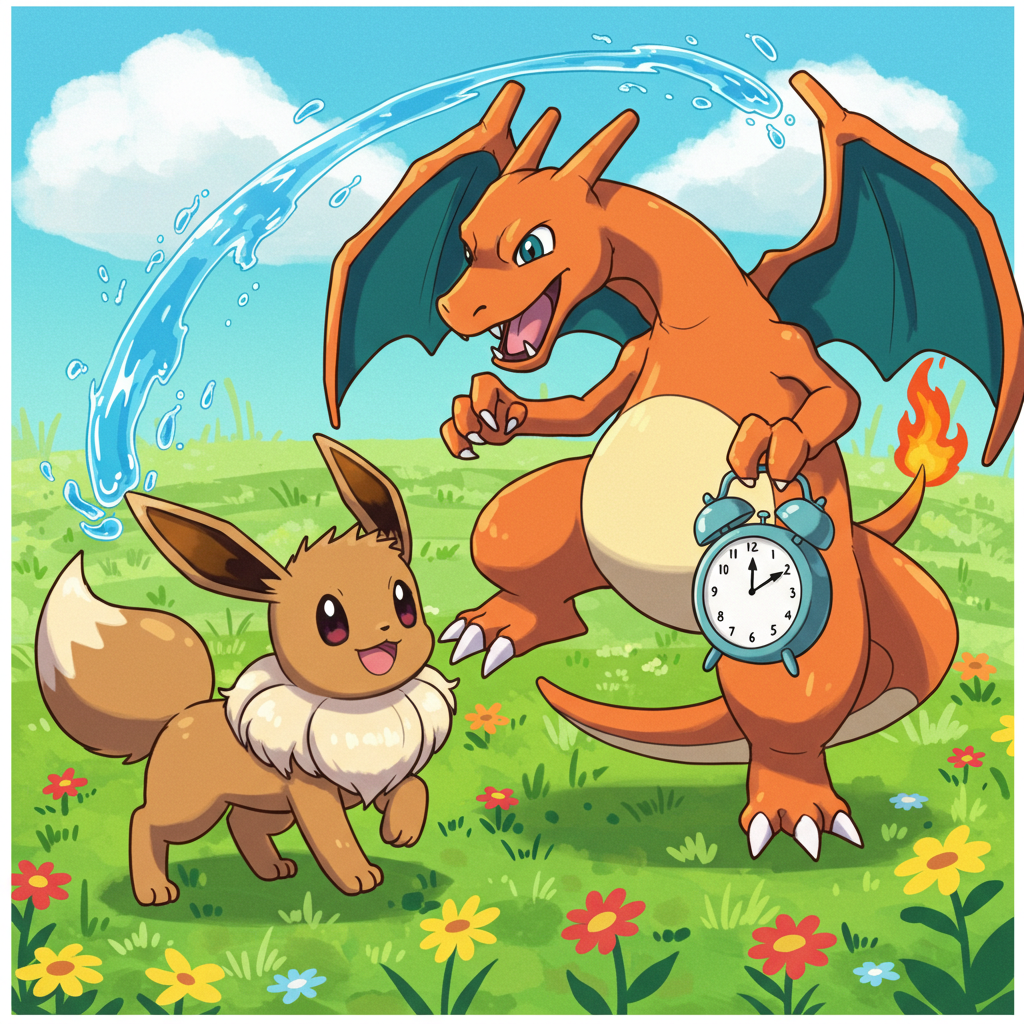
When writing code, we often want to know how fast it runs ⏩ and how much memory it uses 💾. This is where time complexity and space complexity comes in! Let’s break these down using Pokémon themed examples! 🔥
⚡ Big O Notation - The Trainer’s Guide 📖
Big O notation helps us understand how an algorithm scales as the input size grows. Think of it as training a Pokémon: some level up quickly ⚡, while others take longer ⏳!
We’ll go through different complexities using Pokémon-related Python code and compare their speed and memory usage. Let’s gooo! 🎮🔥
🟢 O(1) - Constant Time 📏
Example: Checking a Pokémon’s Type 🛡️🔥
If an operation always takes the same time, no matter the input size, it’s O(1).
pokemon_types = {
"Pikachu": "Electric",
"Charmander": "Fire",
"Squirtle": "Water"
}
def get_pokemon_type(name):
return pokemon_types.get(name)
print(get_pokemon_type("Pikachu")) # ⚡ Electric
No matter how many Pokémon are in the dictionary, looking one up is instant ⚡! This is because Python dictionaries use hash tables, which allow for average-case O(1) lookups. Instead of searching through the entire list, the dictionary computes a unique hash for the key (Pokémon name), and directly accesses its corresponding value (type). This makes lookups extremely efficient compared to searching through a list, which would take O(N) time.
🔵 O(log N) - Logarithmic Time 📉
Example: Searching for a Pokémon in a Sorted Pokedex 📜
If every step reduces the problem in half (like a binary search), it’s O(log N).
def binary_search(pokedex, target):
left, right = 0, len(pokedex) - 1
while left <= right:
mid = (left + right) // 2
if pokedex[mid] == target:
return f"{target} found! 🎉 Yay!"
elif pokedex[mid] < target:
left = mid + 1
else:
right = mid - 1
return f"{target} not found 😢 oh noo!"
pokedex = ["Bulbasaur", "Charizard", "Eevee", "Pikachu", "Squirtle"] # Sorted list 📜
print(binary_search(pokedex, "Pikachu")) # Found in log(N) time!
Each step halves the search space — super efficient! 🔥
🟡 O(N) - Linear Time 🚶♂️
Example: Finding a Pokémon in a Tall Grass Patch 🌿👀
If we need to go one by one through a list, it’s O(N).
def find_pokemon(grass, target):
for pokemon in grass:
if pokemon == target:
return f"{target} appeared! 🎉"
return "No Pokémon found 😞"
grass = ["Pidgey", "Rattata", "Caterpie", "Pikachu"]
print(find_pokemon(grass, "Pikachu")) # O(N) search
If the wild Pokémon is at the end, we have to check every single one 😰!
🟠 O(N²) - Quadratic Time 😵
Example: Checking All Pokémon Battle Pairs ⚔️
If we compare every Pokémon with every other, it’s O(N²).
team = ["Bulbasaur", "Charmander", "Squirtle", "Pikachu"]
def battle_pairs(team):
for pokemon1 in team:
for pokemon2 in team:
if pokemon1 != pokemon2:
print(f"{pokemon1} battles {pokemon2}! ⚔️")
battle_pairs(team) # O(N²) - Too slow for large teams! 🐌
This gets really slow with big teams! 🚶♂️→🏃♂️→🐌
🔴 O(2ⁿ) - Exponential Time 😱
Example: Generating All Possible Pokémon Teams 🎲
If an algorithm doubles its work for every extra input, it’s O(2ⁿ) … very bad!
def generate_teams(team):
if not team:
return [[]]
smaller_teams = generate_teams(team[:-1])
return smaller_teams + [t + [team[-1]] for t in smaller_teams]
pokemon_team = ["Pikachu", "Charizard", "Blastoise"]
print(generate_teams(pokemon_team)) # Exponential growth! 🚀
This explodes FAST! 🚀 Not ideal for large inputs! 🔥
💾 Space Complexity - How Much Memory? 🧠
- O(1) Space: Uses constant memory (e.g. a few variables ✅)
- O(N) Space: Uses memory proportional to input size (e.g. storing all Pokémon in a list 📜)
- O(N²) Space: Stores all possible Pokémon matchups 😵
- O(2ⁿ) Space: Keeps ALL possible Pokémon teams in memory! 🔥
Summary Table
| Complexity | Time | Example |
|---|---|---|
| O(1) | Fastest ⚡ | Dictionary lookup 🔎 |
| O(log N) | Fast 📈 | Binary search in Pokédex 📜 |
| O(N) | Medium 🚶♂️ | Searching through grass (linear) 🌿 |
| O(N²) | Slow 🐌 | All battle pairs ⚔️ |
| O(2ⁿ) | Super Slow 🔥 | Generating all possible teams (exponential) 🎲 |
🎉 Conclusion
Understanding time and space complexity helps you write better and faster code! 🏆 Next time you code, think: is this the most efficient way? ⚡ Or will it take forever like Magikarp using Splash? 🐟😂